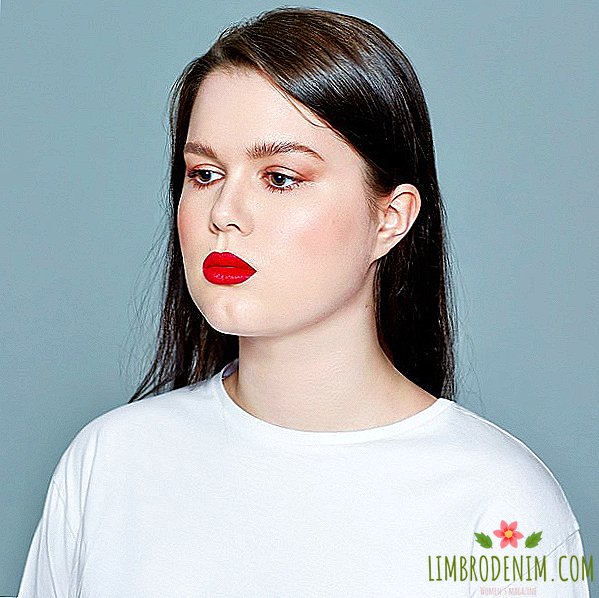Theater and film critic Olga Shakina about favorite books
IN BACKGROUND "BOOK SHELF" we ask heroines about their literary preferences and editions, which occupy an important place in the bookcase. Today, theater and film critic Olga Shakina talks about her favorite books.

 I began to disassemble the letters of the year at four with my grandfather's help - I remember how after a day of very tedious lessons several things suddenly formed into the word "soap", and I did not quite understand how this happened. A little later, being ill, I could not live without a book - it was boring, and, sitting in bed, I re-read the same pamphlet with children's verses, and I was not enough.
I began to disassemble the letters of the year at four with my grandfather's help - I remember how after a day of very tedious lessons several things suddenly formed into the word "soap", and I did not quite understand how this happened. A little later, being ill, I could not live without a book - it was boring, and, sitting in bed, I re-read the same pamphlet with children's verses, and I was not enough.
I remember how it was with books in the Soviet era - in my case, in the restructuring: we gave the waste paper and got some arbitrary, not even you selected crap. I was also lucky that grandfather and dad worked in Hungary and for some reason it was from there that publications in Russian were carried. Therefore, in my children's library there were large-format burgundy volumes of anthologies of a Soviet play and Soviet poetry (there I read Bulgakov's Ivan Vasilyevich and Trenova's Lyubov Yarovaya and shuddered), as well as a pearl! - two-volume opera libretto. It was furious that all the operas ended badly, except for one - I don’t remember which one, but it was at the very end of the second volume, after Leoncavallo: the twentieth century had come, the characters relaxed.
The same nonsense was with collections of national fairy tales: there were Afghan people in our house, and there were solid forced marriages that entailed suicides. Having already taken communion with libraries in holiday homes, I realized that, for example, in African fairy tales, unlike in the Middle Eastern ones, the other (but not more likeable) mode is where people and animals cheer each other cheerfully. I was constantly re-reading and the reference collection of legends and myths of ancient Greece Kuhn - in his turn, the prosaic syllable converted from the hexameter and the repulsive pre-Christian ethics infuriated. He did a good job, now they peck your liver, and everyone, including the narrator, pretends that it is necessary - is this normal? I remember how I read about the Trojan War, everything is more disgusting, more disgusting for me, the pages are scrolling harder - it turned out that the temperature rises, and I - probably seven years old - came down with the first childhood flu.
On school fires - this is when everyone gathers in class, having fun, drinking and eating - they gave books: the class in the third half of students, I remember, they gave comics about the king of monkeys, and the other - “Blacksmith of Big Wootton” Tolkien in Nagibin translation. Everyone, like the institutions, wanted a king - I had one, and I immediately bartered him for the "Blacksmith", sat in the corner and read it right there. I was shocked by these magical forests, storms and stars in the forehead: Middle Ages, Romanticism, Victorianism - then I felt that all this is mine, and I still think so too (if it is honestly).
More signs of the late eighties and early nineties - all ordered some svezheanonsirovannye volume by subscription. We subscribed to the collected works of Conan Doyle, but only the first volume came. We also wrote an etymological dictionary. My dad and I loved to guess where one word or another came from, and at some point he said: "But we will surely know everything when we get these ... small ..." - and I picked up: "... great-minded!" He, of course, never came. But soon the 286th computer with a humming modem appeared in the house - the first messenger of the fact that dictionaries will soon cease to be needed.
Mom was friends with the general director of the publishing house "Pushkin Square" (he was soon killed), he gave her a lot: translated American fiction, a multi-volume Solzhenitsyn. All these were pretty cheap paperbacks. "The Gulag Archipelago" I swallowed entirely in ten years - to be honest, since my childhood I have missed a terrible reading, all sorts of horrors. Stephen King has not yet published, and I read the "Archipelago" in search of horror. I was aware that Solzhenitsyn was a great public figure, but a writer, well, like that. I read without the pleasure of the syllable, but one place, about streams that merge into a large full-flowing river, snuck at me: no, I think, after all, he and the writer are in places completely nothing. I wrote this place in the diary.
Reading in English began (but unsuccessfully) at fourteen from a book that my father found on the seat of a Dutch electric train - I constantly paid attention to the author's name on the spine: at the end there are two "t", a very strange name. I asked my dad what she was talking about, about some secret youth society. I tried to start, but could not understand anything, of course. I had a lot of versions, what this book is about, what a secret society. Surprisingly, I returned to Tartt only a couple of years ago - I read “Little Friend” and then “Shchegla”, but that “A Secret History” did not: I want to read exactly that book with the adhesive tape on the cover that Dad found in the train which dad held in his hands, but she, of course, was lost, and I will never find her.

Konrad Lorenz
"Aggression, or the so-called evil"
The book of the ethologist, the Nobel laureate, on how intraspecific aggression works - from animals to humans. My first distinct non-fiction, once and for all laid the algorithm, how to learn, explore the world. Everything has a structure that can potentially be known - but that doesn't make it any less surprising. My favorite example from there: Austrian Lorenz, perfectly remembering the Anschluss, admits that at the sounds of the good old march, he still reflexively straightens his shoulders and feels the blessed chill running through the ridge. And he immediately explains where this reflex came from: in a combat situation, the humanoid monkeys straightened to their full height and wooded their coat in order to appear larger to the enemy. Feelings that we tend to sacralize are checked by biology - but it’s still feelings. And another quote: "The world will be saved by scientific knowledge and a sense of humor." Golden words, Conrad - if the world is still able to save.
Niklas Luhmann
"Introduction to Systems Theory"
Deciphering the lectures of the great German sociologist who rethought sociology in terms of the theory of thermodynamics (including). Closed and open systems, entropy, balance as the least stable of all the provisions - this book, in which each line was rammed with a huge number of meanings with maximum efficiency, disaccustomed me to fear people around and taught me to approach any fear systemically. Afraid of something? Learn how it functions. Estimation will go, the presentation will remain.
Arkady and Boris Strugatsky
"One billion years before the end of the world"
When they say that the Strugatsky are lightweight or idealistic, I find it funny: they have several really great novels, and one of them is “The Billion”, not very popular, by the way (except perhaps because it is based on its “Eclipse Days” "Sokurov took - but in the film from the novel, in general, nothing was left). Several late Soviet scientists are independently engaged in research and development - and they encounter strange resistance: their phone calls are distracting from their thoughts, they pay a visit from their bodies, or a beautiful woman comes, or a neighbor commits suicide.
They eventually come to the conclusion that it is a law of nature that tries to save itself from studying - and some scientists give up, and one puts all their work in a pile and is taken to find points of contact in them - to study the law that hinders the study of other laws. Again my credo: whatever scares you - study this, you have no other way out. From these three books was my scientism. And I still reread "Billion", because it is also an amazing language - the last one and a half pages are especially good, where the main character gives the brave friend a folder with elaborations and curses himself for conformity, repeating the meditative phrase: "Since then everything is dragging on my curves are deaf roundabout paths. "
Pavel Pryazhko
Plays
The Belarusian playwright is our, without exaggeration, a great contemporary, the only topical artist who works with the material that is maximally sacralized in our logo-centered society — with the word, and therefore unprecedentedly bold. Having an exceptional sense for this word. He has texts consisting of photographs or recordings of Valeriy Leontyev and Alla Pugacheva, but there are also quite narrative (though invariably musical, sounding oratorios) things like “Three days in hell” or “Parks and gardens”. All this can be found on the Web, but soon in Belarus the funds collected on the Internet will release the collection Pryazhko. I highly recommend finding it. This is the main thing that is happening now, before our eyes, with the Russian language.
Nikolay Baytov
"Think what you say"
The representative of the exact sciences (pseudonym taken in honor of the unit of storage of digital information), prepares the language cleaner Vladimir Sorokin. This collection is about the adventures of language in the space of naming and storytelling, such structural and linguistic fantasies. One hero pours letters from ice at dawn. Another meets a wanderer, a mirror man, who communicates, exclusively repeating the last words of the interlocutor. A peasant who speaks a strange, pseudo-popular dialect shoots a cranberry. Language as a very strange hero.
Denis Osokin
Oatmeal
The main magic realist of Russian literature is from Kazan. He is not just sensitive to the ethnic, but he invents the ethnic himself - and this is something completely incomprehensible. The last time the brains worked so paradoxically for Andrei Platonov, Sorokin demonstrated such clarity and uniqueness of the artistic method, and probably this knowledge of human nature - Chekhov. Everything about him is an illusion, and the figure of the author is including: he constantly presents himself in his own prose and at the same time runs away from authorship. In general, life is Osokian dream.
Anton Chekhov
"Ivan Matveich"
A story from which I invariably cry, even when I just retell it, is the most Chekhovian of the Chekhov's stories. A choleric professor hires a clerk to dictate his natural science work to him. The clerk is always hungry, clumsy and does not particularly want to work. And instead of recording, he sneaks up his pocket with pretzels from a vase, and then tells the employer how they catch corn in the spring in their village. The professor is irritated, but again and again he calls the clerk to work, and a strange symbiosis arises. In general, nothing happens - people find the human in each other and, embarrassed by this pulp, still touch it. Here I am now crying again.
Tibor Fisher
"And then they'll tell you that you kicked"
Modern British Chekhov is the cutest writer of the Barnes, Lodge and Amis Jr. generation. Everyone loves his "Philosophers from the High Road", and I like this story from the book entitled "Do not read this book if you are stupid." The story about the weekdays of the lawyer by appointment, who meets strange people every day - by chance and at work. About how everything is gentle, fragile and sad, as we love.
Arkady Averchenko
"A dozen knives in the back of the revolution"
The angry, bitter, inconsistent monologue of a person from whom the whole world was stolen - these are my Twelve, a reminder of why since childhood I consider idealism the most horrible and bloody, bad, and where my allergies are to utopias. Broad-eyed Averchenko has always been my hero - I am very glad that he, unlike Bukhov, did not return to Soviet Russia, did not head the magazine "Crocodile", did not write denunciations and did not rot in the camps, but instead sat in Paris and wrote drowning in tears and bile, these awkward twelve uneasy pieces are about a girl who knows how to distinguish the sound of a machine gun from the sound of a sidecar, Little Red Riding Hood who is ready to go to her grandmother no longer than the legitimate eight-hour working day, singing an international or Petersburg old women, meeting sevastopol sky sunset
Vasily Lomakin
"Subsequent texts"
The most beloved of modern Russian poets - an employee of the American Cancer Research Institute, it seems; Lomakin is a pseudonym. This is our Auden - not in the modernist, but in the postmodern space, where images and words have come off each other, the absurd mixed with gentle, pathos has no place left: "When I was water - and I already had water - I walked through pipes and there was always a crane. "




